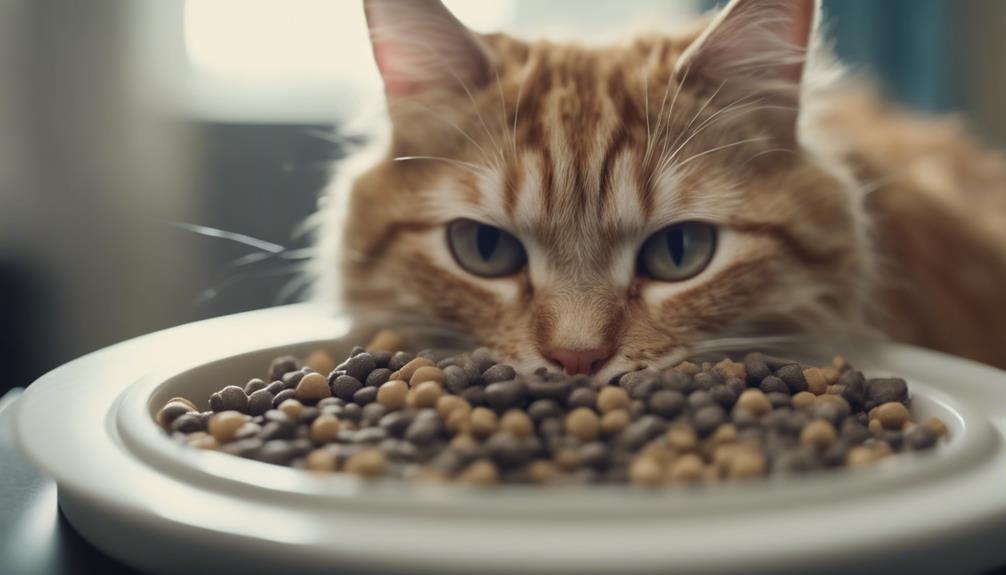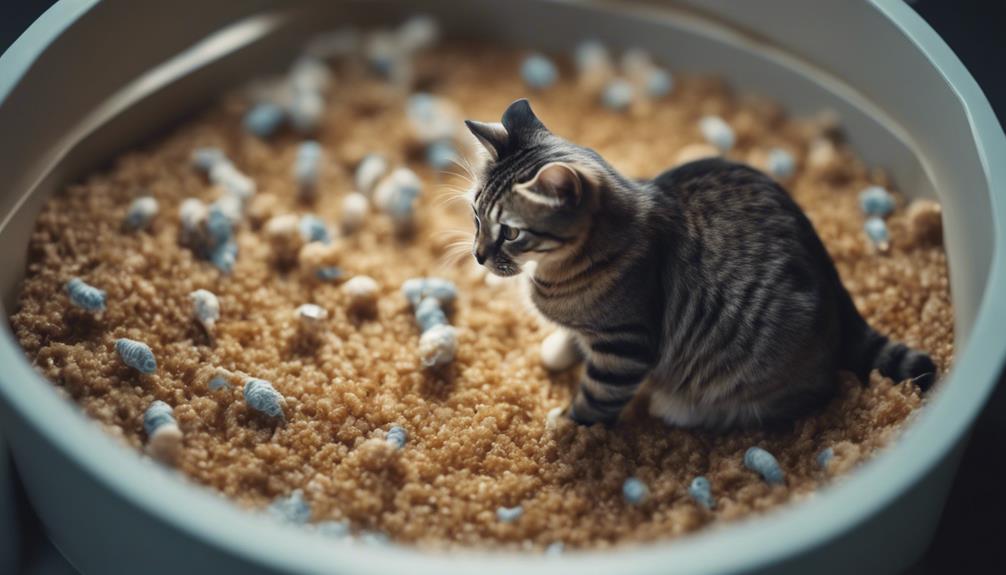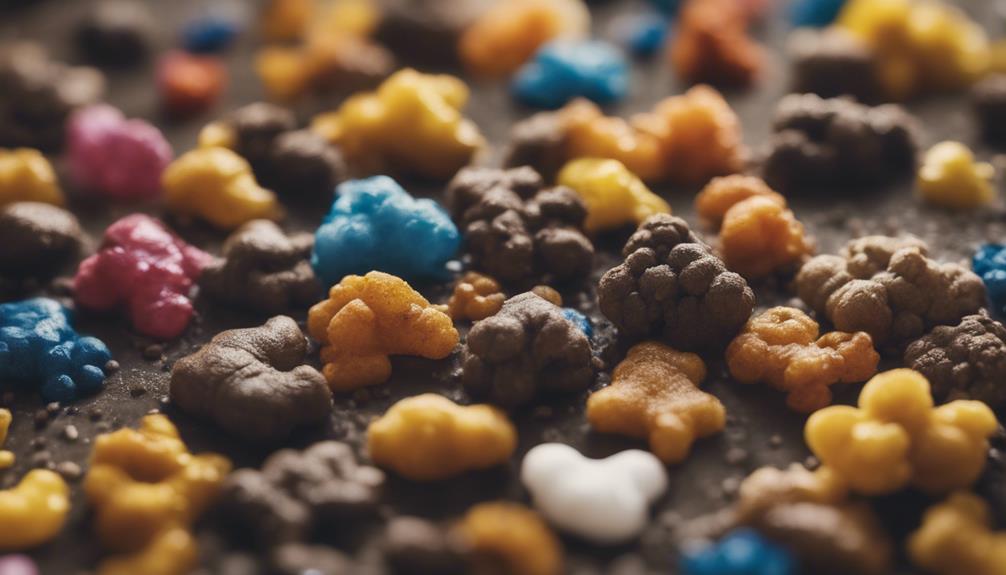Exploring the intricate world of cat pooping patterns unveils a wealth of insights crucial for safeguarding our feline companions' health.
From deciphering the significance of bowel movement frequency to understanding the impact of various factors like diet, stress, and allergies, there lies a tapestry of considerations waiting to be unraveled.
By shedding light on these essential facets, a deeper understanding of how to support our cats' digestive well-being emerges.
So, let's journey into the realm of cat health to uncover valuable tips that can pave the way for optimal health and vitality in our furry friends.
Key Takeaways
- Cat's diet impacts poop frequency; wet diets reduce movements.
- Stress disrupts bowel habits; maintain calming routines.
- Parasites cause irregularity; test yearly for prevention.
- Food allergies affect digestion; hypoallergenic diets ease symptoms.
Factors Affecting Pooping Frequency
Factors influencing a cat's pooping frequency encompass a variety of elements such as diet, stress levels, health conditions, and the presence of parasites. All of these play crucial roles in determining the regularity of bowel movements in feline companions.
A cat's diet significantly impacts the frequency of bowel movements. High-carbohydrate dry kibble diets lead to more frequent pooping compared to wet or raw diets.
Stress is another factor that can disrupt a cat's bathroom routine, causing irregular bowel movements, especially in anxious cats.
Additionally, digestive parasites can result in diarrhea and irregular bowel patterns. This emphasizes the importance of regular fecal tests and prompt treatment.
Understanding and addressing these factors are essential in maintaining a cat's digestive health and ensuring regular and healthy pooping habits.
Importance of Balanced Nutrition
A cat's overall well-being and digestive health are significantly influenced by the nutritional balance provided in its diet.
- Balanced nutrition is essential for maintaining a healthy gut microbiome and normal bowel movements.
- High-carbohydrate dry kibble diets lead to more bowel movements.
- Wet and raw diets with higher digestibility ratios result in fewer bowel movements.
- Diets low in fiber can cause constipation.
- Balanced nutrition supports a healthy gut microbiome and regular bowel movements.
Diet's Influence on Pooping Habits

The composition of a cat's diet significantly impacts its pooping habits, influencing the frequency and consistency of bowel movements. The type of diet plays a crucial role in determining how often a cat will poop.
High-carbohydrate dry kibble diets typically lead to more frequent bowel movements, while wet and raw diets with higher digestibility ratios result in fewer trips to the litter box. Diets low in fiber can contribute to constipation issues.
Ensuring a balanced nutrition plan is essential for supporting a healthy gut microbiome and promoting regular bowel movements. By selecting the right diet tailored to your cat's needs, you can help maintain healthy pooping habits and overall digestive wellness.
Managing Stress for Healthy Bowel Movements
Stress management plays a crucial role in ensuring a cat's digestive health and maintaining regular bowel movements. Stress can significantly impact a cat's bathroom routine and overall well-being.
Here are five essential tips for managing stress in cats to promote healthy bowel movements:
- Create a calm environment by providing hiding spots and elevated perches.
- Establish predictable routines for feeding, playtime, and litter box cleaning.
- Use pheromone diffusers or calming collars to reduce anxiety.
- Provide interactive toys and mental stimulation to alleviate stress.
- Seek veterinary advice for behavior modification techniques or potential medication to manage severe stressors.
Impact of Parasites on Digestive Health

Parasites in a cat's digestive system can disrupt normal bowel movements and lead to gastrointestinal issues. Digestive parasites, such as worms, can cause diarrhea and irregularity in cats' bowel habits. It is important to monitor the cat's stool for any signs of parasites, such as visible worms or segments.
Yearly preventive fecal tests are essential for early detection and appropriate treatment of these parasites. Prompt treatment can help restore normal bowel movements and prevent further complications. Maintaining good hygiene practices and preventing exposure to parasites are crucial for a cat's overall digestive health.
Regular veterinary check-ups and deworming protocols can help safeguard against the harmful effects of parasites on a cat's gastrointestinal system.
Dealing With Food Allergies and Intolerance
When managing food allergies and intolerance in cats, identifying and eliminating allergens from their diet is key to improving digestive health and overall well-being.
- Conduct an elimination diet to pinpoint the specific allergen causing the issue.
- Consult a veterinarian for guidance on suitable hypoallergenic food options.
- Keep a food diary to track the cat's diet and any associated symptoms.
- Gradually transition to a new diet to prevent digestive upsets.
- Monitor the cat's stool consistency and overall well-being for improvements.
Recognizing Symptoms of Digestive Issues

Digestive issues in cats can manifest through various noticeable symptoms that warrant attention from pet owners and veterinarians alike. Symptoms of digestive problems in cats include changes in litter box habits, such as increased or decreased frequency of bowel movements, diarrhea, constipation, or straining during defecation.
Cats may also display signs of abdominal discomfort, such as bloating, vomiting, lethargy, weight loss, or lack of appetite. Additionally, the presence of blood in the stool or around the rectal area can indicate underlying digestive issues that need to be addressed promptly.
Observing and recognizing these symptoms is crucial for early intervention and treatment to ensure the overall health and well-being of the feline companion.
Maintaining Hygiene for Digestive Health
To uphold optimal digestive health in cats, meticulous maintenance of hygiene practices plays a pivotal role in promoting overall well-being.
- Regularly clean the litter box to prevent the buildup of harmful bacteria.
- Wash your hands thoroughly after handling cat feces to avoid potential infections.
- Keep your cat's living area clean and sanitized to minimize exposure to germs.
- Ensure your cat's water and food bowls are washed regularly to prevent contamination.
- Regular grooming helps prevent fur from matting and reduces the chances of ingesting hair, which can lead to digestive issues.
Frequently Asked Questions
Can a Cat's Pooping Frequency Change With Age?
A cat's pooping frequency can change with age due to factors like diet, health conditions, and metabolism. As cats age, their digestive system may slow down, leading to changes in bowel movements. Regular veterinary check-ups can help monitor and address such changes.
How Can Environmental Changes Affect a Cat's Pooping Habits?
Environmental changes, such as moving to a new home or the introduction of new family members, can disrupt a cat's pooping habits due to increased stress. Providing a calm environment, routine, and addressing stressors promptly can help regulate a cat's digestive system.
Are There Specific Breeds of Cats That Are More Prone to Digestive Issues?
Certain cat breeds like Siamese, Maine Coon, and Persians may be predisposed to digestive issues due to genetic factors. However, all cats can experience digestive problems influenced by diet, stress, parasites, and allergies. Regular vet check-ups are essential for monitoring digestive health.
Can Over-The-Counter Remedies Help Regulate a Cat's Bowel Movements?
Over-the-counter remedies can help regulate a cat's bowel movements by addressing specific issues like constipation or diarrhea. However, it is crucial to consult a veterinarian before administering any medication to ensure the appropriate treatment for the cat's condition.
Is There a Correlation Between a Cat's Water Intake and Their Pooping Frequency?
A cat's water intake can influence their pooping frequency. Sufficient hydration aids digestion and promotes regular bowel movements. Cats consuming inadequate water may experience constipation, while those with proper hydration levels are likely to have healthy and consistent pooping habits.
How Can I Monitor My Cat’s Digestive Health and Pooping Patterns?
When it comes to monitoring your cat’s digestive health and pooping patterns, it’s essential to keep a close eye on any changes in their behavior or litter box habits. According to cats fart experts say, paying attention to the frequency, consistency, and odor of your cat’s poop can provide valuable insights into their overall digestive well-being.
Conclusion
In conclusion, understanding the various factors that influence a cat's pooping patterns is crucial for promoting their digestive health.
From the importance of balanced nutrition to managing stress and addressing potential issues like parasites and food allergies, taking proactive steps to support a healthy gut microbiome is essential.
By recognizing and addressing potential digestive issues promptly, pet owners can ensure their feline companions maintain optimal bowel movements and overall well-being.




